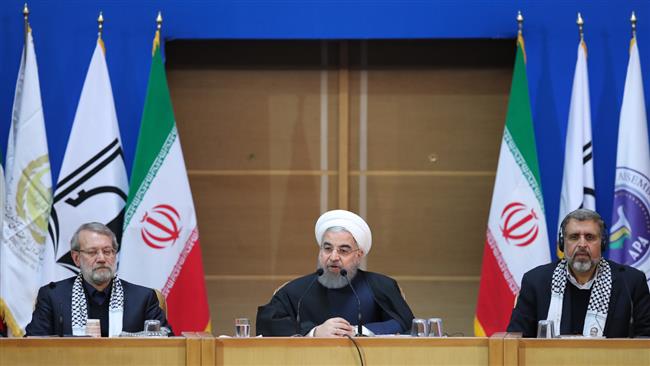
RNA - Addressing the 6th International Conference in Support of the Palestinian Intifada (Uprising) in Tehran on Wednesday, the Iranian president raised the alarm over the Tel Aviv regime’s attempts to normalize relations with certain Arab countries of the region.
“The occupying regime [of Israel], in an attempt to normalize its situation, has for the first time referred to certain Arab countries as its allies against the resistance front, instead of describing them as its enemies," he said.
The Tel Aviv regime "claims that most of the Arab countries are not the enemies of Zionism or opposed to occupation anymore, but that they share the same phobia about resistance,” Rouhani added.
The Iranian president called on the countries of the region to remain vigilant in the face of Israeli plots, and said the Muslim world needs to clarify its position on the issue of Israel’s efforts to normalize its ties with Arab countries.
“Isn’t it the time that neighbors once and for all say ‘No’ to war and fratricide?" Rouhani asked, calling for collective efforts to resolve the Palestinian issue, which he described as the Muslim world's major problem.
He warned that normalization of ties between certain Arab countries and Israel was in fact turning a blind eye to the regime’s crimes in Palestine and other Muslim countries.
The Iranian president’s remarks come as Israeli Prime Minister Benjamin Netanyahu said on Tuesday that Arab countries did not consider Israel their enemy anymore.
“Many Arab countries (will) realize Israel is not their enemy but their valuable ally in fighting off the barbarism that surrounds all of us,” Netanyahu said in the Australian city of Sydney.
Most Arab governments have no official diplomatic relations with Israel. Even so, reports have indicated that several of them, including Saudi Arabia, have had secret relations with Tel Aviv.
Elsewhere in his remarks, the Iranian president said that a lasting peace will not be restored to the Middle East region unless Palestine was liberated and the rights of the Palestinians were fully restored, including the return of all refugees to their homeland and the formation of a Palestinian state with East Jerusalem al-Quds as its capital through a holding referendum with the participation of all Palestinians.
The two-day Tehran conference on Palestine, attended by around 700 foreign guests from dozens of countries and representatives of pro-Palestinian organizations, wrapped up on Wednesday with a statement that voiced support for the rights of the Palestinian nation and underlined the need for an end to Israel’s nearly seven decades of occupation.
In the statement, the participants underlined the need for further unity among the Palestinians, and highlighted resistance as the sole solution to the Palestinian issue.
They also called on the international community to mount pressure on Israel to put an end to its “inhumane” measures in the occupied territories, including killing and forced expulsion of Palestinians.
The attendees also called on the parliaments of Arab and Muslim countries to ban any political and economic relations with Israel.
847/940